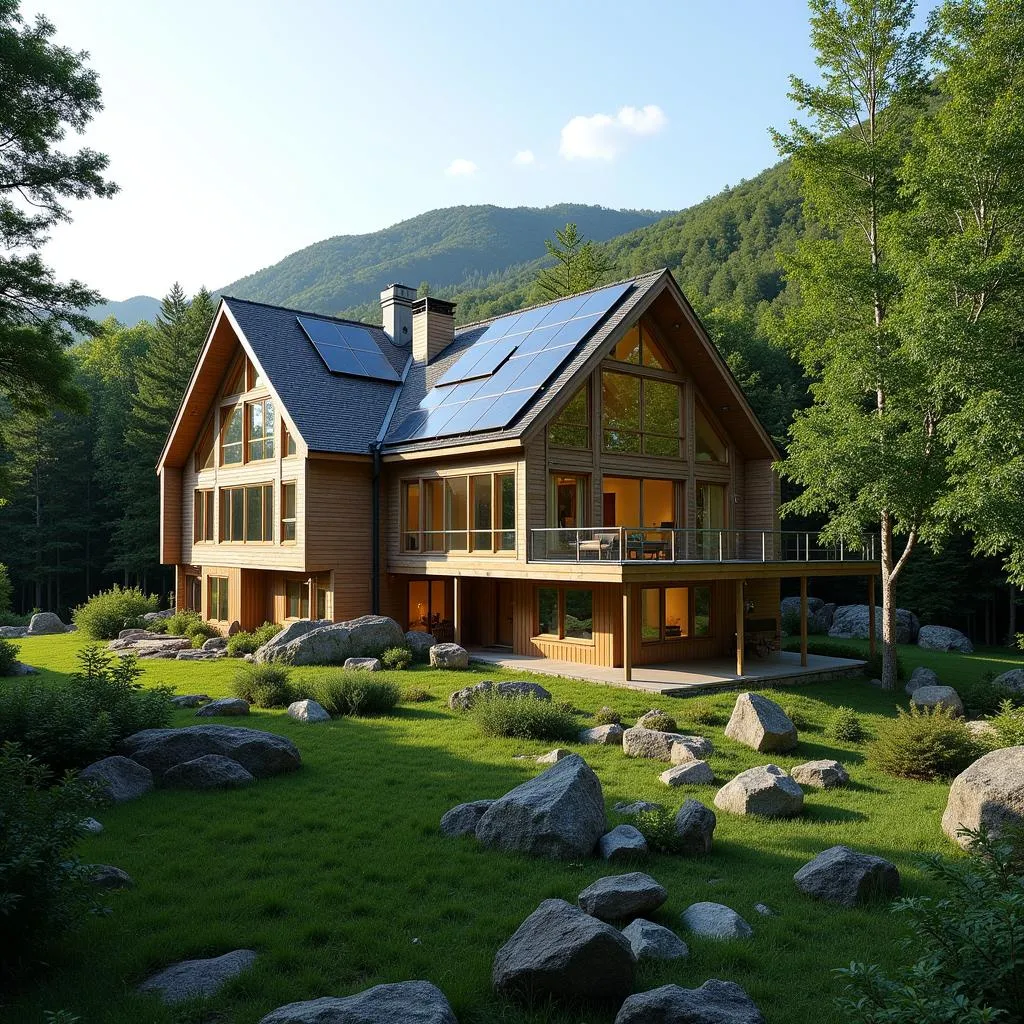The topic of describing an ideal place to live is a common one in IELTS Speaking tests. It has appeared frequently in past exams and is likely to remain relevant in future tests. This topic allows examiners to assess candidates’ ability to express preferences, describe locations, and discuss lifestyle choices. Let’s explore how to tackle this topic effectively across all parts of the IELTS Speaking test.
Part 1: Introduction and Interview
In this section, the examiner may ask general questions about your current living situation or preferences. Here are some common questions and a sample answer:
- Where do you currently live?
- What do you like or dislike about your current home?
- Would you prefer to live in a house or an apartment?
Sample answer (Band 7-8):
“I currently live in a small apartment in the city center. While I appreciate the convenience of being close to work and amenities, I sometimes find the constant noise and lack of green spaces a bit overwhelming. Ideally, I’d prefer to live in a house with a garden, as it would offer more space and privacy. Having my own outdoor area would be a welcome change from the concrete jungle I’m surrounded by now.”
Describe a famous mountain you would like to visit for a similar approach to discussing geographical preferences and aspirations.
Part 2: Long Turn (Cue Card)
Here’s a sample cue card related to describing an ideal place to live:
Describe an ideal place where you would like to live
You should say:
- Where this place is
- What it looks like
- What facilities it has
- And explain why you would like to live there
Sample answer (Band 6-7):
“The ideal place I’d like to live in is a cozy cottage in the countryside, about an hour’s drive from the nearest city. It’s a charming two-story house with a thatched roof and white-washed walls, surrounded by a picturesque garden full of colorful flowers and old trees.
The cottage has all the modern amenities one could need, including high-speed internet, a fully equipped kitchen, and a comfortable living room with a fireplace. There’s also a small home office where I can work remotely when needed.
I’d love to live there because it offers the perfect balance between a peaceful rural lifestyle and access to urban conveniences. The serene environment would allow me to escape the hustle and bustle of city life, while still being close enough to enjoy cultural events or meet friends in town. The cottage’s charm and the surrounding natural beauty would be a constant source of inspiration and relaxation for me.”
Sample answer (Band 8-9):
“My ideal dwelling would be a sustainably designed house nestled in the foothills of a mountain range, approximately a two-hour drive from a major metropolitan area. This eco-friendly abode would seamlessly blend into its natural surroundings, featuring floor-to-ceiling windows that offer panoramic views of the lush landscape and a living roof covered in local vegetation.
The house would be equipped with state-of-the-art facilities, including a solar power system and a rainwater harvesting setup to minimize its environmental impact. A high-tech home automation system would control everything from lighting to temperature, ensuring optimal energy efficiency. There would also be a fully equipped home gym and a dedicated workspace with high-speed internet connectivity for remote work.
I’m drawn to this location for several compelling reasons. Firstly, it would provide an idyllic retreat from the frenetic pace of urban life, allowing me to reconnect with nature and find inner peace. Simultaneously, its proximity to a major city would ensure that I’m not completely isolated from cultural experiences and social interactions. Moreover, living in such an environmentally conscious home would align perfectly with my values of sustainability and responsible living. The combination of breathtaking natural beauty and modern amenities would create an environment conducive to both personal growth and professional productivity.”
Follow-up questions:
- How important is the location of a home to you?
- Do you think people’s ideal living places change as they get older?
Sample answer (Band 8-9):
“The location of a home is paramount to me, as it significantly impacts one’s quality of life. A well-chosen location can enhance one’s daily experiences, from the commute to work to leisure activities. It’s not just about convenience; it’s about finding a place that resonates with one’s lifestyle and aspirations.
Regarding how ideal living places change with age, I believe this is often the case. As people progress through different life stages, their priorities and needs evolve. For instance, young professionals might prioritize vibrant urban areas with networking opportunities, while families may seek quieter neighborhoods with good schools. Retirees might prefer locations with a slower pace of life and access to healthcare facilities. This shift reflects the changing balance between career, family, and personal well-being throughout one’s lifetime.”
Part 3: Two-way Discussion
In this section, the examiner will ask more abstract questions related to the topic. Here are some potential questions and sample answers:
- How do you think cities will change in the future to accommodate growing populations?
Sample answer (Band 7-8):
“I believe cities will need to become more vertical and efficient to handle growing populations. We’ll likely see more high-rise buildings and mixed-use developments that combine residential, commercial, and recreational spaces. Public transportation systems will need to expand and become more sustainable, possibly with the introduction of more electric vehicles and bike-sharing programs. Green spaces might be incorporated into building designs, with rooftop gardens and vertical forests becoming more common.”
Sample answer (Band 8-9):
“The evolution of cities to accommodate burgeoning populations will likely be multifaceted and revolutionary. We can anticipate a paradigm shift towards ‘smart cities’ that leverage cutting-edge technologies to optimize resource allocation and enhance livability. This might involve the implementation of IoT (Internet of Things) sensors to manage traffic flow, energy consumption, and waste disposal more efficiently.
Vertical urbanism will likely gain prominence, with mixed-use skyscrapers becoming self-contained communities. These structures could incorporate vertical farms to promote local food production and reduce carbon footprints. Additionally, we might witness the rise of floating or underwater cities in coastal areas to address land scarcity issues.
Sustainable transportation will be at the forefront, with autonomous electric vehicles and hyperloop systems potentially revolutionizing urban mobility. The concept of ’15-minute cities’, where all essential services are accessible within a short walk or bike ride, might become the new urban planning standard. These changes will aim to create more resilient, inclusive, and environmentally friendly urban ecosystems capable of sustaining larger populations while improving quality of life.”
- Do you think it’s better for people to own their homes or rent? Why?
Sample answer (Band 8-9):
“The decision to own or rent a home is highly context-dependent and varies based on individual circumstances and local market conditions. Both options have their merits and drawbacks.
Home ownership offers several advantages. It provides a sense of stability and security, allowing people to put down roots in a community. Owning a property can be a valuable long-term investment, potentially appreciating over time and building equity. Homeowners also have the freedom to customize and renovate their living spaces according to their preferences.
On the other hand, renting offers flexibility and can be financially advantageous in certain situations. Renters are not tied down to a specific location, making it easier to relocate for career opportunities or lifestyle changes. Renting also alleviates the responsibilities of property maintenance and the financial burden of unexpected repairs. In high-cost urban areas, renting might be more affordable than buying, allowing individuals to live in desirable locations that would be out of reach if purchasing.
Ultimately, the choice between owning and renting should be based on factors such as financial stability, career trajectory, local real estate markets, and personal long-term goals. In some cases, a combination of both – such as owning a primary residence while renting a vacation home – might offer the best of both worlds.”
Describe something you did in your studies or work that made you feel confident provides insights into discussing personal achievements and experiences, which can be applied to describing your ideal living situation and its impact on your life.
Key Vocabulary and Structures for High Scores
To achieve a high score in the IELTS Speaking test when discussing your ideal place to live, consider using the following vocabulary and structures:
-
Idyllic /aɪˈdɪlɪk/ (adjective): extremely pleasant, beautiful, or peaceful
Example: “The idyllic countryside setting would provide a perfect escape from city life.” -
Sustainable /səˈsteɪnəbl/ (adjective): able to be maintained at a certain rate or level
Example: “I dream of living in a sustainable home that minimizes its environmental impact.” -
Amenities /əˈmenətiz/ (noun): desirable or useful features of a place
Example: “The neighborhood offers a wide range of amenities, including parks and shopping centers.” -
To prioritize /praɪˈɒrətaɪz/ (verb): to designate or treat something as more important than other things
Example: “When choosing a place to live, I prioritize safety and access to good schools.” -
Quality of life (phrase): the standard of health, comfort, and happiness experienced by an individual or group
Example: “Living in a quiet suburb has significantly improved my quality of life.”
 Sustainable eco-friendly house in the mountains
Sustainable eco-friendly house in the mountains
Examiner’s Advice
To excel in the IELTS Speaking test when describing your ideal place to live:
-
Be specific: Provide detailed descriptions of your ideal living place, including its location, features, and surroundings.
-
Use varied vocabulary: Incorporate a range of adjectives and specific terms related to housing and environment.
-
Explain your reasons: Always elaborate on why certain aspects of your ideal place are important to you.
-
Connect to personal experiences: Relate your ideal living situation to your current circumstances or past experiences for more authentic responses.
-
Practice fluency: Work on speaking smoothly and confidently about various aspects of housing and lifestyle preferences.
By following these tips and utilizing the provided vocabulary and structures, you can effectively communicate your ideas about an ideal place to live and improve your chances of achieving a high score in the IELTS Speaking test.
Describe a concert you want to attend for practice in describing future aspirations and preferences, which can be applied to discussing your ideal living place.


